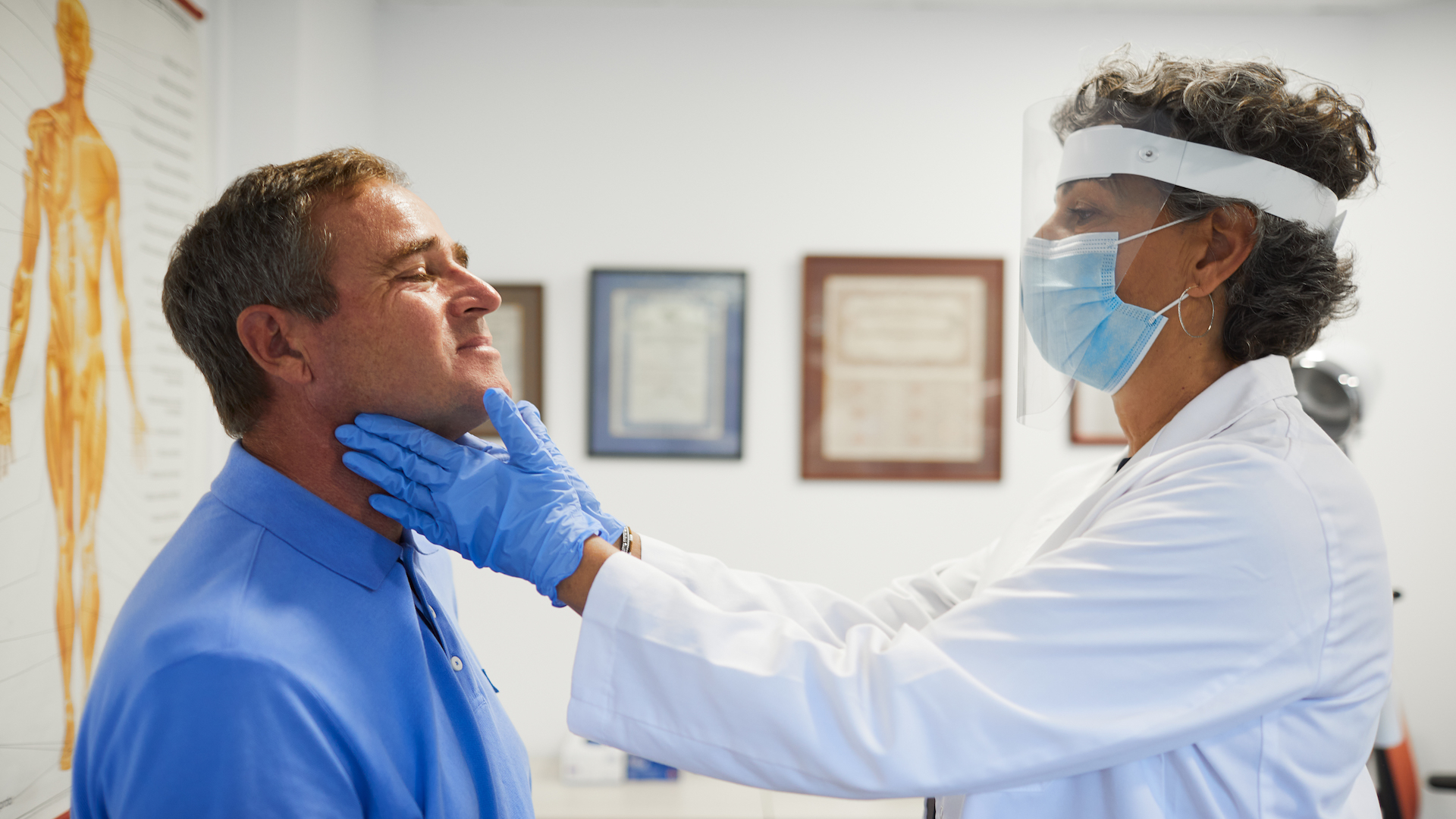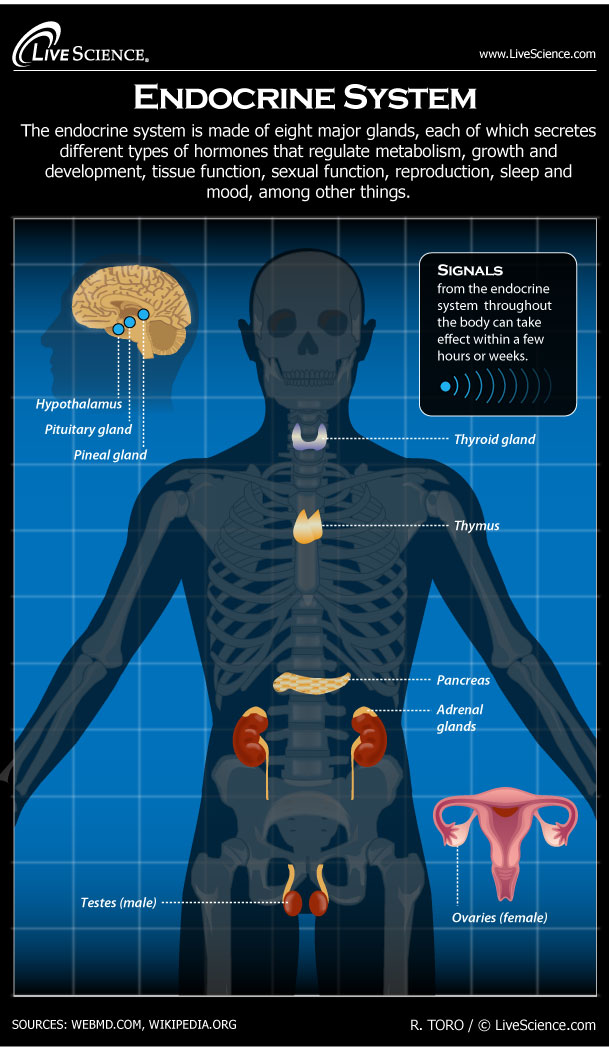What does the endocrine system do?
Facts and information about the endocrine system.

The endocrine system is the collection of glands that produce hormones, which are specialized proteins that regulate bodily functions. The endocrine system serves as the body's internal chemical signaling system, sending messages in the form of hormones to organs throughout the body via the circulatory system. Metabolism, growth and development, tissue function, sexual function, reproduction, sleep and mood are all examples of body functions that are regulated by hormones.
Endocrine system function
The endocrine system is made up of the hypothalamus, pituitary gland, thyroid gland, parathyroid glands, adrenal glands, pancreas, ovaries and testes, according to Johns Hopkins Medicine. These glands produce and secrete hormones into the bloodstream for use elsewhere in the body. Although hormones circulate throughout the entire body, different types of hormones target different organs and tissues.
Here's a summary of what each gland does:
| Gland | Function |
|---|---|
| Adrenal glands | Located on the tops of the kidneys, these glands produce steroid hormones such as corticosterone, which helps regulate the body's stress response and maintain homeostasis. |
| Pituitary gland | The pituitary gland is a small bean-shaped gland at the base of the brain. It controls the thyroid gland, adrenal glands, ovaries and testicles by secreting hormones that signal those glands to also produce hormones. |
| Hypothalamus | The hypothalamus is a small gland in the brain located near the pituitary gland. It collects information from virtually all other areas of the central nervous system, and in response it releases hormones that tell the pituitary gland which hormones to send out to other glands. |
| Thyroid gland | The thyroid is a butterfly-shaped gland located in the neck. It controls the metabolic activity of all cells. |
| Parathyroid glands | These four small glands are located behind the thyroid, like spots on a butterfly's wings. They monitor and regulate calcium levels. |
| Pancreas | The pancreas is a long, flat organ that sits just behind the stomach. It produces insulin, which allows muscles and tissues to absorb sugar in the bloodstream, and glucagon, which releases sugars from fat to raise blood sugar levels. The pancreas also secretes digestive enzymes called pancreatic juice. |
| Ovaries | Human females are typically born with two ovaries — female gonads that stem from the uterus. They are the primary female reproductive organs, producing reproductive hormones called estrogen and progesterone, and some lesser hormones called relaxin and inhibin. |
| Testes | Testes, or testicles, are the male reproductive organs, which are contained in sacs of skin called the scrotum. They produce hormones called androgens, which control the male reproductive system. The most well-known androgen is testosterone. |
The endocrine system gets some help from other organs, such as the kidneys, liver and heart, which have secondary endocrine functions. For example, the main function of the kidneys is to filter the blood, but the kidneys also produce hormones that assist in the production of red blood cells, and they metabolize, or process, several other hormones for use in other parts of the body , as described in a 2018 review published in the Methodist DeBakey Cardiovascular Journal.

Endocrine system diseases
Endocrine system diseases or disorders occur as a result of hormone imbalance or when the body does not respond to hormones as it should. Stress, illness, infection or changes in blood composition can all influence hormone levels and in turn cause endocrine disorders, according to the National Institutes of Health (NIH).
Here's a summary of some of the most common endocrine diseases:
- Diabetes: The most common endocrine disease in the United States is diabetes, a condition in which either the pancreas does not produce enough insulin — the hormone that regulates blood sugar — or the body's cells don't respond to insulin properly. Diabetes is typically treated with pills or insulin injections.
- Reproductive hormone disorders: Reproductive hormone imbalances can affect fertility and may have long-term effects on metabolic, cardiovascular and bone health. For example, polycystic ovary syndrome in females is associated with hormone imbalances that cause a variety of symptoms, such as irregular periods, acne and fertility loss, according to the University of British Columbia. And in men, low testosterone results in low energy, reduced strength and libido, and increases the risk for low bone density.
- Hypothyroidism: Hypothyroidism occurs when the thyroid gland does not produce enough thyroid hormone to meet the body's needs. Insufficient thyroid hormone can cause many of the body's functions to slow or shut down completely. The disease is treated by surgically removing the damaged part of the gland.
- Thyroid cancer: Thyroid cancer begins in the thyroid gland and starts when the cells in the thyroid begin to change, grow uncontrollably and eventually form a tumor. From 1990 to 2013, the global incidence of thyroid cancer increased by 20%, according to a 2020 review published in the journal Nature Reviews Endocrinology. The American Cancer Society predicts that there will be about 44,280 new cases of thyroid cancer in 2021 and around 2,200 deaths from thyroid cancer in the United States alone.
- Hypoglycemia: Hypoglycemia, also called low blood glucose or low blood sugar, occurs when blood glucose drops below normal levels. This typically happens as a result of treatment for diabetes when too much insulin is taken. The condition can also occur in people not undergoing treatment for diabetes, but such an occurrence is rare, according to the Mayo Clinic.
What is an endocrinologist?
Endocrinologists are medical doctors –– often gynecologists and pediatricians –– who specialize in typically one or two areas of endocrinology, such as diabetes or infertility. These specialists train to diagnose and treat specific endocrine disorders. Patients are usually referred to endocrinologists by their primary doctors.
To become an endocrinologist, a student needs to attend college as well as complete a degree in internal medicine before they specialize in endocrinology. In the U.S., this process takes about 13 years, before they are certified by the American Board of Internal Medicine.
Additional resources
- Learn about endocrine diseases from the National Institutes of Health
- The Merck Manual provides comprehensive information about the endocrine system
- Here's a Khan Academy video explaining how hormones flow through the body
This article was updated on Nov. 9, 2021 by Live Science Contributor Sarah Wild.
If you’d like more information on this topic, we recommend the following book:
Sign up for the Live Science daily newsletter now
Get the world’s most fascinating discoveries delivered straight to your inbox.
Kim Ann Zimmermann is a contributor to Live Science and sister site Space.com, writing mainly evergreen reference articles that provide background on myriad scientific topics, from astronauts to climate, and from culture to medicine. Her work can also be found in Business News Daily and KM World. She holds a bachelor’s degree in communications from Glassboro State College (now known as Rowan University) in New Jersey.










